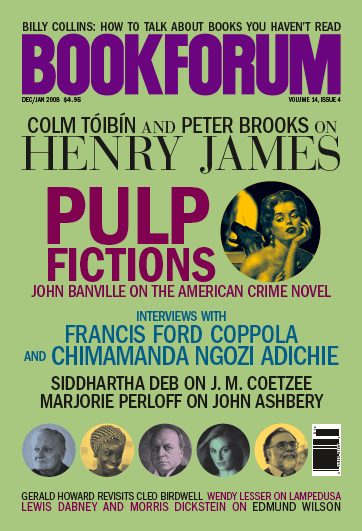
Poet Matthea Harvey creates a universe of her own but doesn’t post signs telling readers how to get there or get around after arriving. And this lack of authorial direction is precisely why her poems are so wonderful. In Modern Life, each reads like a stern and glorious fable of freakishness. The idiosyncratic world they inhabit reflects maddeningly back on our own: The sun (“yellow provocateur”) materializes beneath an umbrella only to be dumped at a lighting store (“Let it feel like everyone else”). Moons, meanwhile, bereft of their planets, suffer the indignity of orbiting the dinner plates that emerge from a restaurant’s kitchen. Human bodies sprout electric sockets (“First the prong marks appeared on my cheeks as if someone had scratched equals signs under my eyes”); animals are halved and re-formed into hybrids or discarded at the Empty Pet factory. Even lovely flowers are made of ham, “each petal a little meat sunset.”
In the totality of her invention, and the deadpan confidence with which she describes these wild creations, Harvey has more in common with fiction writers like Donald Barthelme and George Saunders (who blurbed the book) than with other modern poetseven fellow absurdists like Kenneth Koch and Mina Loy. (It’s no surprise that her preferred form in this collection is the prose poem—she’s a storyteller.) Still, a trace of Francis Ponge can be found in the wryly detailed meditations on, among other things, centaurs, figureheads, and punctuation, as in the endearing “Word Park”: “The comma is the timid creature (ankle-height, cringing) you’ll spot when you pause to look at the map, the dash is the sprinter in a thin coat of rain.” But Harvey’s characters herald darkness; for her, as for Barthelme and Saunders, whimsy is never far from morbidity and catastrophe.
In the sequences titled “The Future of Terror” and “Terror of the Future,” Harvey free-associates vaguely apocalyptic scenarios; each line reads like a shudder from an ending world, sometimes labored, sometimes frighteningly true: “The lake breeze was lugubrious / at best, couldn’t lift the leaves. As the day lengthened, / we knew we’d reached the lattermost moment. / The airlift wasn’t on its way.” The phrase future of terror naturally begets a terror of the future, a sense that futurity itself might not be assured. The poem “You Never Seemed So Human” hints at a darker fate: “So we married in the UFO: / they didn’t know what we meant / when you said pony and / I whispered mountain / in the chilly Hall of Collectibles.” With these quick strokes, Harvey conjures a loving couple, seemingly abducted on a Noah’s Ark–like spaceship, then relegated to the aliens’ museum collection when they exchange words that recall the planet they’ve lost.
Not all her poems grapple directly with imminent disaster; many are preoccupied with hybridity, whether literal—a half-cat, half-goat creature—or, as one poem is titled, an “Ode to the Double-Natured Sides of Things.” Harvey relishes the surprising, at times uncomfortable, relationship between incommensurable beings. Her catgoats patrol shop windows and battle it out over their own image: “cat wanting to see its cat reflection, goat wanting to see goat.”
A similar dilemma applies to the tension between some of Harvey’s titles and their poems. For instance, the heading “Waitressing in the Room with a Thousand Moons” poses a daunting challenge—how will the poem rise to something so provocatively opaque; by what means will it tease out its riddle? (One suspects that a few titles preceded their poems.)
Sometimes this strategy works, sometimes it doesn’t. “You Have My Eyes” consists of just one, rather coquettish line: “Give them back.” At its most egregious, this preciousness devolves into a parlor game, as when Harvey recycles Vasari’s description of Leonardo’s pet lizard: “and having made / for it eyes, horns, / and a beard, / he tamed it / and kept it / in a box, / but all his friends / to whom he showed it / used to run away / from fear.” Harvey’s titular punch line: “I Would Have Stayed.”
Brilliant though these far-flung visions of apocalypse and catgoats may be, Harvey’s best poems are those that move us (or make us laugh) by reflecting the world we inhabit today rather than the one we fear tomorrow. She handily evokes quotidian absurdities, like the distance that separates even the closest of lovers: “The cave woman and cave man lie side by side, each head filled with bright images the other can’t see. Even when they press their ears or mouths or noses together, the skull wall is still in the way.” Or the struggle to find familiarity in a landscape of alienating otherness:
Plant me
just below
the potatoes.
I won’t complain
if their root patterns
don’t exactly
match my synapses—
chances are they’ll be
closer than lightning
or anything else
I’ve found
aboveground.
And even her smallest observation hums: “I sit in the second-floor window and watch leashes strain between dogs and people.”
But Harvey is not simply a poet of astonishing inventiveness, flaunting beautiful visions for the reader like a peacock ruffling his feathers. Her fables aren’t fanciful escapist romps; they’re pointed cautionary tales. You may have already taken the wrong turn into my universe, she implies, and if you don’t think fast and hard, you’ll never be able to leave. Our moon hasn’t been consigned to a fast-food restaurant just yet, but the reality is almost as dire: “We’ve got a lock / on the moon so now it goes where we want it— / mostly proms, sometimes lobbies.” Her diagnosis of modern life may be funny, but it’s no less serious for being so: “Today it’s about truth and hope / and there are no ha-ha’s / between me and the living.”
Heather Caldwell is a writer living in Brooklyn.
